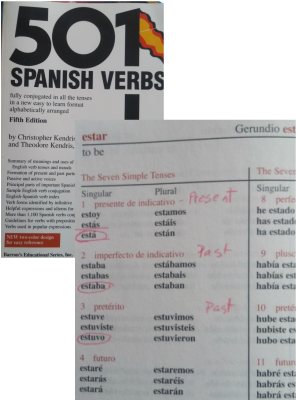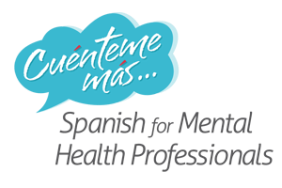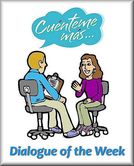by Alfonso M. López and Cynthia M. Braden, MFT
One of the major cultural considerations to keep in mind when treating Spanish speaking families is Respeto.

Question: As a psychotherapist how do I understand and practice Respeto?
Answer: One way to demonstrate Respeto is to be comfortable using the Usted form in all your verb tenses!
Question: Wow! how do I do that?
Answer: We are going to show you a relatively simple and specific aspect of Spanish that you can study to improve your ability to use the Usted (polite) form instead of the Tu (familiar) form when interacting with clients and others in professional settings.
When you are comfortable using the Usted form consistently in all your verbs, you are strongly demonstrating an aspect of Respeto.
You will need a Spanish verbs dictionary like this one that conjugates each verb for you.
This is the Estar page.
Study the third person singular conjugation like where it is circled in red. That is the tense you want to choose when speaking to clients.
To make phrases, questions and statements using the Usted form, choose the third person singular in past, present, future, conditional, imperative or any of the additional compound tenses you may want to practice using.
Operationalize Respeto
To demonstrate Respeto make it your objective to consistently form sentences using the Usted conjugation of whatever verb you are using when speaking with clients, especially those who are older or of a higher rank.
Confirming that Respeto is still important to therapists well into the twenty-first century, our students report an improvement in client engagement and cooperation when practicing and implementing this aspect of Spanish within the therapeutic relationship.
We concur that using the Usted form instead of Tu, helps therapists improve the effectiveness of their practice principally by gaining the client's trust in the therapist and the therapeutic process.
Answer: One way to demonstrate Respeto is to be comfortable using the Usted form in all your verb tenses!
Question: Wow! how do I do that?
Answer: We are going to show you a relatively simple and specific aspect of Spanish that you can study to improve your ability to use the Usted (polite) form instead of the Tu (familiar) form when interacting with clients and others in professional settings.
When you are comfortable using the Usted form consistently in all your verbs, you are strongly demonstrating an aspect of Respeto.
You will need a Spanish verbs dictionary like this one that conjugates each verb for you.
This is the Estar page.
Study the third person singular conjugation like where it is circled in red. That is the tense you want to choose when speaking to clients.
To make phrases, questions and statements using the Usted form, choose the third person singular in past, present, future, conditional, imperative or any of the additional compound tenses you may want to practice using.
Operationalize Respeto
To demonstrate Respeto make it your objective to consistently form sentences using the Usted conjugation of whatever verb you are using when speaking with clients, especially those who are older or of a higher rank.
Confirming that Respeto is still important to therapists well into the twenty-first century, our students report an improvement in client engagement and cooperation when practicing and implementing this aspect of Spanish within the therapeutic relationship.
We concur that using the Usted form instead of Tu, helps therapists improve the effectiveness of their practice principally by gaining the client's trust in the therapist and the therapeutic process.
Additional Examples of Using Usted Form in Clinical Psychotherapy Practice
USTED FORM | TU FORM |
| How are you? ¿Cómo está usted? | ¿Cómo estás? |
| How do you feel today? ¿Cómo se siente hoy? | ¿Cómo te sientes hoy? |
| It was a pleasure to meet you Mr. Martinez. Fue un placer conocerlo, Señor Martinez. | Fue un placer conocerte, Señor Martinez. |
| I hope to see you at the same time next week. Espero verlo a la misma hora la semana que viene. | Espero verte a la misma hora la semana que viene. |
Age Considerations
We have heard children as young as three and four years old being called Usted by their parents in a pre-school setting. Most of the time though, we can safely use the form Tu when talking to younger clients. It is hard to pinpoint the exact age appropriate for the use of Tu, but it may feel awkward to say Usted to someone under twenty years of age.
Curiously, for advanced-level Spanish speaking therapists who are not used to this concept, changing their habits, or getting used to using the Usted form may take more energy than for a therapist who is more of a beginner at Spanish.
So we recommend to start practicing the use of Usted early and often, not only in verbs but also in pronouns, articles, direct and indirect objects and open the doors to a more effective practice with your Spanish speaking clients. Our videos and teleconferences can help tremendously!
Curiously, for advanced-level Spanish speaking therapists who are not used to this concept, changing their habits, or getting used to using the Usted form may take more energy than for a therapist who is more of a beginner at Spanish.
So we recommend to start practicing the use of Usted early and often, not only in verbs but also in pronouns, articles, direct and indirect objects and open the doors to a more effective practice with your Spanish speaking clients. Our videos and teleconferences can help tremendously!

 RSS Feed
RSS Feed



